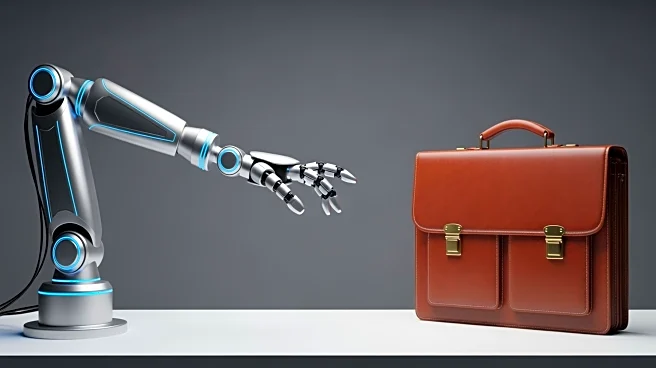What's Happening?
A recent study by the British Standards Institution (BSI) highlights a concerning trend among UK businesses, where the adoption of artificial intelligence (AI) is leading to a reduction in entry-level jobs, particularly affecting Generation Z. The study surveyed
over 850 business leaders and found that 61% of firms are investing in AI to boost productivity and efficiency, with 49% aiming to cut costs, often by reducing headcount. Notably, 76% of UK business leaders reported using AI to decrease their workforce, with 38% specifically targeting junior and entry-level roles. This shift is seen as a short-term strategy to enhance profitability but poses long-term risks by potentially closing off career entry points for young professionals.
Why It's Important?
The increasing reliance on AI to replace entry-level positions could have significant implications for the future workforce. As large organizations prioritize immediate financial gains, they risk undermining the development of a skilled workforce, which could lead to a skills gap and increased generational inequality. This trend places small and medium-sized enterprises (SMEs) in a pivotal role, as they may become the primary source of employment and training for Gen Z. The study suggests that SMEs, less aggressive in AI adoption, could offer more opportunities for young professionals, thus becoming crucial in maintaining a robust skills pipeline.
What's Next?
If the current trend continues, SMEs may need to adapt by enhancing their training and development programs to accommodate the influx of Gen Z workers. Meanwhile, large firms might face pressure to balance AI integration with sustainable workforce development strategies. Policymakers and industry leaders could also be prompted to address the potential long-term impacts on employment and skills development, ensuring that technological advancements do not exacerbate social and economic disparities.
Beyond the Headlines
The ethical implications of AI-driven job reductions raise questions about corporate responsibility and the social contract between businesses and society. As AI continues to evolve, companies may need to consider the broader societal impacts of their technological strategies, balancing innovation with the need to support workforce resilience and inclusivity.















